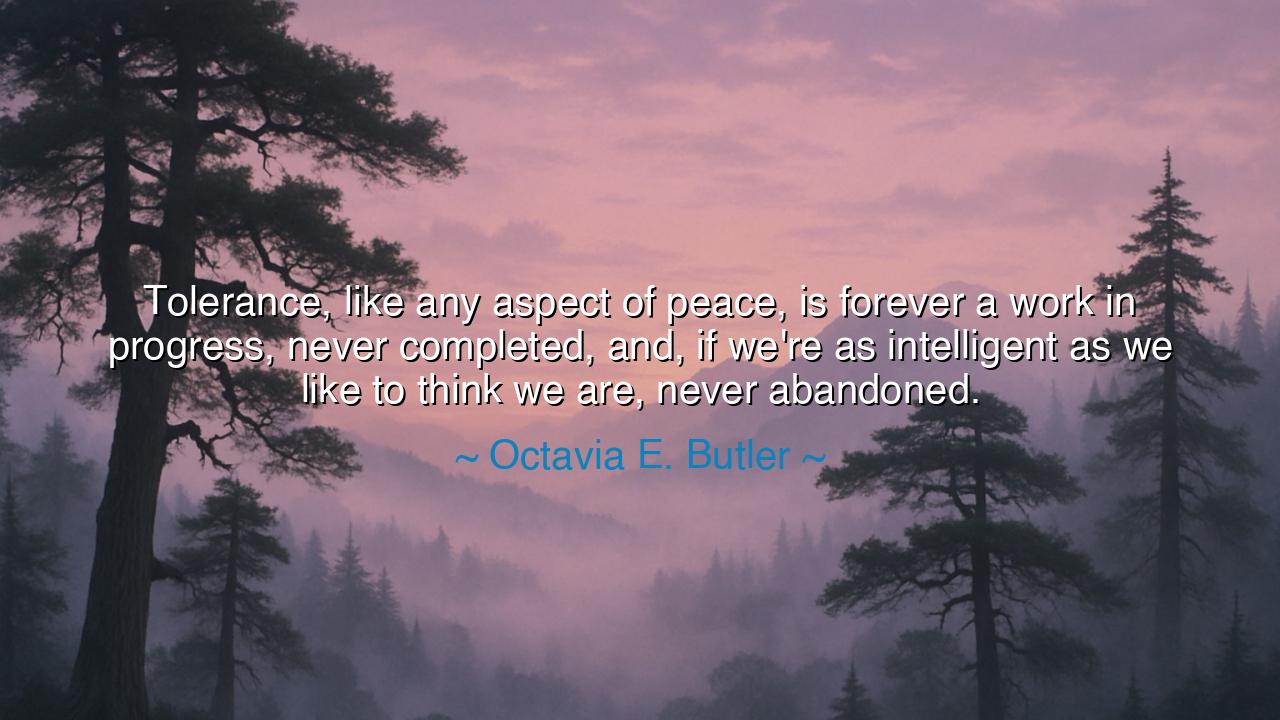
Tolerance, like any aspect of peace, is forever a work in
Tolerance, like any aspect of peace, is forever a work in progress, never completed, and, if we're as intelligent as we like to think we are, never abandoned.






The words of Octavia E. Butler—“Tolerance, like any aspect of peace, is forever a work in progress, never completed, and, if we're as intelligent as we like to think we are, never abandoned”—flow like a river of wisdom that refuses to dry. In them is contained a truth that humankind has struggled with since the dawn of time: that tolerance is not a destination reached once and for all, but a continual effort, a discipline of the spirit, a practice that must be renewed day after day. Like the tending of a garden, it requires vigilance, patience, and humility, for weeds of hatred and division ever seek to grow again.
The origin of these words lies in Butler’s own life and work. As a writer of speculative fiction, she dared to imagine futures shaped not merely by technology but by human character. She saw clearly that progress is fragile, that even great civilizations can stumble backward if they abandon the daily labor of compassion and understanding. Her quote is both a warning and an encouragement: humanity, if truly wise, will never abandon the task of tolerance, because to do so is to abandon the very possibility of lasting peace.
History has given us powerful lessons in this regard. Consider the long journey of the American Civil Rights Movement. Victory did not arrive in a single march, a single speech, or even in a single law passed. It was, and remains, a work in progress. Dr. Martin Luther King Jr. and countless others reminded the world that true equality could only be achieved if tolerance was cultivated in the hearts of men, and that this cultivation was not a momentary struggle but a continual one. Even after great strides were made, vigilance was—and still is—required, for intolerance seeks always to return.
The meaning of Butler’s words reaches beyond nations and movements into the life of each individual. For every heart must wrestle daily with the temptation to dismiss, to belittle, or to fear the other. Tolerance is not weakness; it is strength of character. It is the deliberate choice to see the dignity in another, even when their beliefs or customs differ from our own. It is the recognition that peace is fragile, and that only through constant effort can it be preserved. Just as fire must be fed to keep burning, so must tolerance be nurtured to survive.
The ancients too knew this struggle. The philosopher Marcus Aurelius wrote in his Meditations that we must live in harmony with others, for they are our kin, though their ways may differ from ours. The Buddha spoke of compassion as the path to end suffering, urging his followers to embrace even their enemies with loving-kindness. And Christ commanded his disciples to love their neighbors as themselves. Each of these voices, across cultures and centuries, speaks the same truth Butler distilled: tolerance is never completed, never abandoned.
The lesson for us is clear: we must never imagine that progress toward peace is final. We must never believe that tolerance, once achieved, requires no further tending. Hatreds can reawaken, divisions can reemerge, violence can rekindle if we grow complacent. But if we are indeed as intelligent as we claim, then we will commit ourselves anew each day to the labor of understanding, to the practice of patience, and to the discipline of listening.
Practically, this means we must act in our own small spheres. In our families, in our communities, in our workplaces, we must extend tolerance—listening before judging, seeking to understand before condemning. We must challenge prejudice wherever it arises, even in ourselves. We must practice the difficult art of empathy, of stepping into another’s shoes. And when fatigue sets in, we must remember Butler’s words: the work is never done, but it is also never to be forsaken.
Thus, let the wisdom of Octavia E. Butler be carried like a banner into the future: “Tolerance, like any aspect of peace, is forever a work in progress, never completed, and… never abandoned.” May it remind us that though the task is endless, it is also sacred. For in the unending labor of tolerance lies the promise of a more humane world, and in the daily practice of peace lies the only path to humanity’s true greatness.






AAdministratorAdministrator
Welcome, honored guests. Please leave a comment, we will respond soon